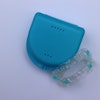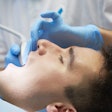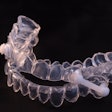
Orthodontically assessing and managing obstructive sleep apnea (OSA) in toddlers is not only controversial, it's not an evidence-based method for improving or curing it. The article was published in the American Journal of Orthodontics and Dentofacial Orthopedics.
Clinicians may be quick to manage OSA with early treatment procedures like maxillary expansion and orthopedic advancement of the upper or lower jaw because it is lucrative, author Dr. Sanjivan Kandasamy of the Center for Advanced Dental Education at St. Louis University in Missouri, wrote.
"This is perhaps the real reason why it has become so popular today despite the lack of data to support such treatments for OSA (obstructive sleep apnea)," Kandasamy wrote (Am J Orthod Dentofacial Orthop, January 2, 2024, Vol. 165:5, pp. 500-502).
In the general pediatric population, the incidence of OSA ranges between 1% and nearly 6%. Untreated sleep apnea in children has been associated with health risks, including cardiovascular conditions, obesity, cognitive impairment, and mood disturbances, according to the article.
Recently, some clinicians have spoken out about early orthodontic intervention, mostly orthopedic maxillary expansion, growth modification, midface advancement, and myofunctional therapy, to improve the signs and symptoms of OSA in children as young as 3 years old. They highlight these interventions to prevent these signs and symptoms returning later despite published literature calling for a more conservative approach.
A review of the literature revealed that there is not enough evidence to support consideration of these more invasive interventions. Additionally, there is little to no quality evidence in support of advocating nasal breathing over mouth breathing, postural correction, and myofunctional therapy to improve OSA in kids as young as 3, Kandasamy wrote.
Therefore, pushing these treatments misinforms the public and scares families into believing that their children will develop medical conditions from a morphological problem that they may not have. Additionally, clinicians who encourage and perform early treatments like expansion and growth modification are giving families false hope that they will effectively manage these problems though the evidence clearly does not support them, he wrote.
"If our colleagues want to carry out orthodontic treatment to treat medical problems on the basis of anecdotal claims and beliefs unsubstantiated by the evidence, such as expansion and growth modification at all costs, then this is not only unethical but grossly misleading to the public," Kandasamy wrote.




















